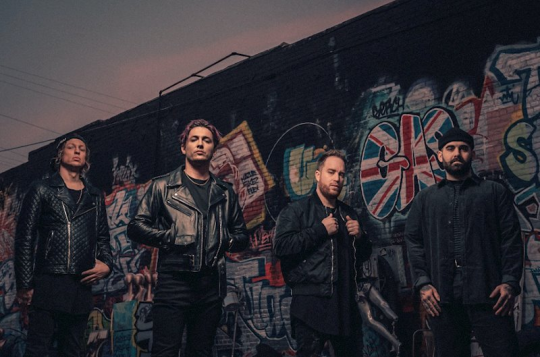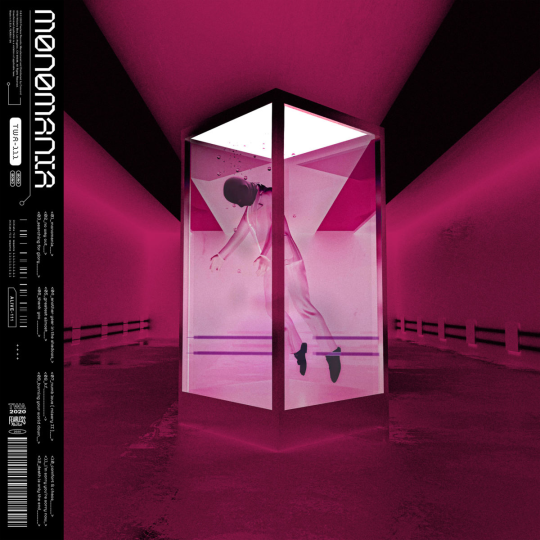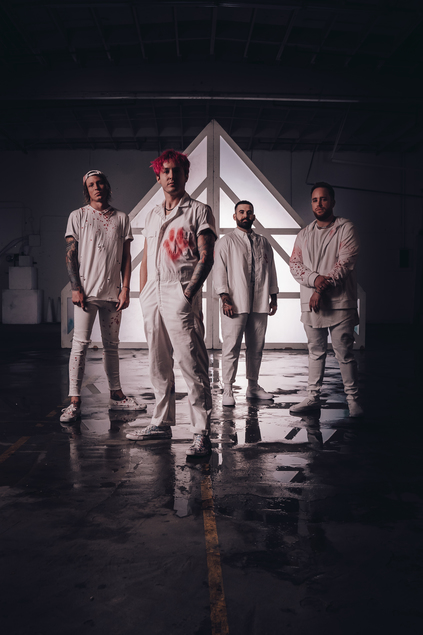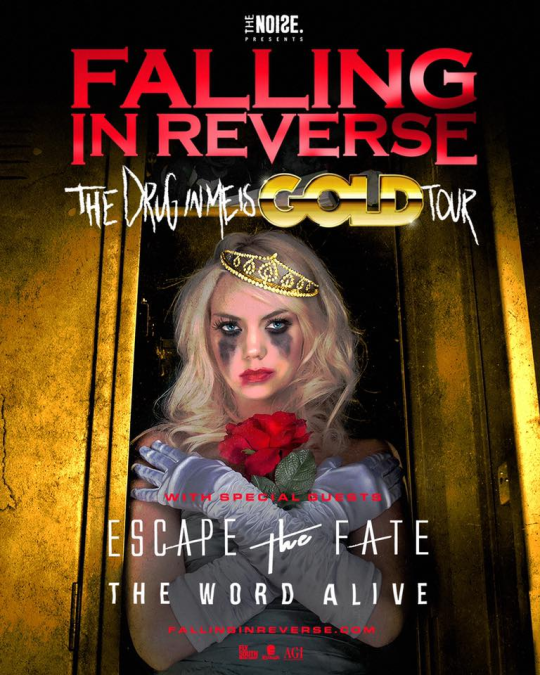
No matter how much some of us might dislike it, change is inevitable. In order to grow, adjustments must be made.
Now does that mean forgetting your past and creating something entirely different? Of course not. But in order to become better, you can’t be afraid to challenge your former self.
Taking this way of thinking and applying it to their music is Arizona act The Word Alive. Giving their previous metalcore-laden sound a 2020 makeover, the Fearless Records outfit has returned better than ever with their new melodic twelve-track effort Monomania.
Detailing this concept of change and pursuing pure authenticity, frontman Telle Smith opened up about his band’s writing process saying, “This definitely is the most The Word Alive record we’ve ever made because this one is the closest to who we all actually are versus what I think people’s perceived idea of what we should be.”
Smith added, “And I know that doesn’t always leave every listener happy, but ultimately, if we’re not happy with what we’re doing and creating and feel like it’s pushing ourselves and our story forward then there wouldn’t be a point of us being a band.”
For more behind-the-scenes chit-chat on Monomania plus what fans can expect from The Word Alive’s upcoming Noise Presents tour with Falling In Reverse and Escape The Fate, be sure to read our in-depth interview with Smith below. Afterward, make sure to not only pre-order Monomania before it hits stores February 21st but also grab tickets to see The Word Alive out on tour here.

What does the title Monomania mean to you? Is there a specific thing that inspired the title for this record?
So kind of an overall theme throughout the record is really just a loss of perspective. You know, when you fixate on the wrong thing or the wrong things, that’s all you can see. You don’t see the good, you don’t see the positive, you can’t find the silver lining. When you feel like your life is falling apart and that’s all you’re focusing on, you’re not going to really do much to change that course. So for me, that was kind of where I was a few years ago and it really took the last three years to get to a really good place. I had just pushed so many things, so many experiences, a lot of pain, different traumas – I mean, throughout my life, I’d always done that – but especially in my adult life, I had really not dealt with a lot of things and I was starting to kind of just lose who I was. And you know, I didn’t even realize it because when you are fixating on things and you lose your perspective, it changes you. It definitely changed me and I was able to still quote-unquote “be enough of myself” to not alarm most people in my life but there were some people who recognized it and said things about it. I kind of either brushed it off or dismissed it or I was even defensive at times about it.
So to me, a lot of the songs are just the story of how far away I got from myself and how I kind of had to destroy that part of me to get back to myself. So a lot of it has to do with that. Not every song. But you know, like “Burning Your World Down” does, “Monomania” does. “No Way Out” is literally about the worst day of my entire life. So there’s a lot of really personal songs on the record. Not every song is [though]. “Another Year In The Shadows” is not about me. There are a few songs here and there that aren’t. But for the majority, the whole record is kind of just about that place because I think a lot of people get stuck and they don’t find their way out. And this is kind of my reflection on that time, how I was feeling some of the things I was going through that I didn’t talk about ever. And, you know, I hope that it can be something that people can be like, “Oh shit, that’s how I feel” or “That’s what I’m going through.” And hopefully, they can see where I’m at now and use that as a little bit of motivation to maybe face some things in their lives that might be painful and uncomfortable but ultimately it’s the right thing to do.
So do you think writing this record was pretty therapeutic for you to get out of that negative space?
Yeah, I felt like I had this baggage that even though I had overcome it in a lot of ways, I definitely feel like I was still carrying it because I felt like I wasn’t sharing really where I’ve been. Some people had noticed I was either different or I was falling into mental or emotional traps or things like negative coping mechanisms that were pulling me away. But for the most part, no one really knew. And so this is kind of my like, you know, “Hey, I’m sorry for the way I may have been towards certain people. This is me taking responsibility for it.” But it’s also me trying to say like, “Hey, this is a chapter in my life. I can’t change it but I can acknowledge that it’s there.” Like, I don’t want to ever forget about it. I don’t want to act like it didn’t happen. That’s not my goal. My goal is to just have it there and acknowledge that this is what happens if you don’t make the right choices and you don’t chase what’s best for you which is trying to be the best version of yourself every day. So this record is going to be a huge reminder of a turning point in my life and hopefully also the band’s career at the same time.
It’s great that you’re being so open and honest about all of this, especially since a lot of your fans use your music to help them get through their own dark times and negative spaces. What kind of music do you usually find yourself listening to when you get into that kind of headspace?
It’s funny because, for me, I listen to a completely different style of music. When I’m feeling a little bit down, I listen to a lot of like Tycho, Explosions In The Sky. I listen to artists like Sasha Sloane, Alec Benjamin and people who do a really good job of writing about their emotions and what they’re going through or gone through or just like music that kind of carries the mood. So that’s more where I lean when I’m trying to relate emotion to a sound because you know, a lot of people associate hard rock and heavy music with anger. And sometimes, obviously, that’s the case. I think when I was younger, I was more angry and just kind of had so much to prove and I think that showed in our music and our lyrics. But now it’s a lot more being reflective. I think some people, you know, they hear music and it makes them feel something and sometimes our music is what people use to go to the gym. Sometimes it’s going to be what they use to get over a breakup to not feel alone if maybe they don’t have the best home life or they’re struggling with depression and anxiety. And then for some people, it’s like their driving music, it’s their get-ready-to-go-out-and-have-a-good-time music. Music is whatever language that person needs it to be and it just depends on your mood and kind of where your thought process is at the time.
Those artists that you listed, do you think any of those influences carried over into this new record?
I think so. I think because of me listening to so much music that isn’t in our genre or our relative genre even, I think the way that I went about melody on this album was completely different. I know this is the most that I’ve felt like myself vocally. [Producer] Eric Ron did a great job of capturing everything I wanted to have in my voice. Like, this is how I’ve wanted my voice to sound for years. With our early recordings, it was like 18 layers of screaming – not actually 18 – but it was a lot and you can’t possibly sound like that. And a lot of the times, it was more than one person screaming and with singing, it was just, you know, whether it was tuned, polished or they would just have me sing the notes like straight on, that was what was popular for that style of music at the time but it wasn’t me. And for the first time ever, someone let me just be myself. So everything you hear on this record is how I wanted to sound. It’s how I would sing something naturally. When I scream, there’s not a ton of layers. I scream stuff like a few times and then that was that. I wanted it to feel very raw. I wanted it to feel more like how it is in a live setting because I look back and say like, Deceiver, Life Cycles, Real – those records, in particular, I barely even recognize that voice. It’s not because I don’t understand how it came to be but it’s not an actual person. Like, I don’t actually sound like that. So for me, it would be like someone playing back your voice and you not recognizing it all versus like now I’m like, “Yeah, this is how I feel I sound in my head.” So I love the way that not having genre restrictions melodically – like, the guys were just totally open to me doing whatever I wanted or felt was right. I feel like there’s a lot more variety in the style of vocals from singing soft or aggressively, whether I’m singing in a lower register to the highest. I just feel like I could do whatever felt right to me. And I feel like that just makes the vocal performance way more authentic.
Coming into this record, was the idea of authenticity and trying new styles where you guys wanted to go initially?
Yeah, I think where everyone has been we understand how we started, but ultimately, when we started The Word Alive and for the first several years, none of us really knew who we were individually – let alone who the band was or what we wanted the band to be. Fortunately enough, we made enough songs people loved and it resonated with them so it carried us past 10 years to where we weren’t just kids anymore. We’re adults now who have enough life experience to truly make decisions that are made not just where we’ve been, where we are but where we want to go.
So for us, this definitely is the most The Word Alive record we’ve ever made because this one is the closest to who we all actually are versus what I think people’s perceived idea of what we should be. And I know that doesn’t always leave every listener happy, but ultimately, if we’re not happy with what we’re doing and creating and feel like it’s pushing ourselves and our story forward then there wouldn’t be a point of us being a band. So there are times on this record where there are no guitars at all – which, going back to our beginning, that would have never happened. But now, we’re more about the overall song, the mood, what is this song about, what are we trying to convey, what emotional journey are we trying to take someone on in this… And if that means no guitars or if that means what you hear on some of the songs – like “Numb Love” has one of the craziest guitar parts we’ve ever done, “I’m Sorry You’re Sorry Now" has one of I think the best and most beautiful guitar solos we’ve ever done. So we have those elements. Even the last track, I think there are parts that are just so amazing and so much more thought out than just how fast can we play. I think everything carries a weight of the emotion of the song. And everything is very calculated. Everyone wanted to fill the space that was needed, not just fill space to be there. I’m really proud of how the record turned out. I’m very conscious of the fact that everyone in the band just did what was best for the song at any given time. Sometimes that’s me doing less, sometimes it’s guitars or sometimes that’s programming or drums and then everyone still has their time to shine and really show what everyone can do. So it was a really fun process this time around.

Are you surprised it’s taken five records for you guys to come to this space collectively? You know, where you’re doing things how you want to do it instead of following the trends of the scene?
You know, I am and I’m not. I know we started feeling this way when we started making Dark Matter and that’s when you can tell a sonic shift in our sound really was the most obvious because the sample size for the songs prior to it like on Real – like if you have a song like “Collapsing” or Life Cycles’ “Astral Plane.” They’re not metal songs, they’re not metalcore songs, they’re not necessarily anything that has a small box name to go with it. We felt like certain songs we were doing had a motion to them and then some songs were like, “Alright, here’s the chorus, then we’re going to do a build-up, then we’re gonna do a breakdown and we’re going to do this. And we have to have this in the song, we have to have that in the song.” And it used to be so calculated in a like “pleasing someone” way. And now it’s calculated in what is best for this song and what is the story that we’re telling. I just think it’s a lot deeper now. But am I surprised it took us this long? Yes and no. Yes because, say you hit like 25 [years old] and you’re like, “Alright, I got it. I know who I am.” Well, we didn’t know shit. And then it’s like, we all hit 30 and we’re like, “You know, we got it all figured out. Not in the way that we thought we did at 25. Now we know that we have it all figured out to here, like up to this point.” And we know that we’re just constantly growing and evolving, changing, learning, experiencing new things. And that’s going to shift the way we think, the way we feel, the way we emote. So, I’m not surprised because now looking back, I’m like, “Yeah, that’s a natural thing people go through. It takes time.” I’m surprised that it took us this long just because we started feeling this way so much sooner than when I feel like we actually got to display it. But thankfully, our fans let us experiment. We had to put out the records we put out to get to this point. If it took five albums to get this record, I can’t imagine what it’s going to be like for the next five.
In today’s day and age with fan interaction being so direct and immediate with Twitter or YouTube comments, do you find that it’s more challenging to be authentic and really put your full self out there?
Well, it’s funny because I was being as open as I knew how along the way but there were several years where – I’d say probably like 2014 to 2018, maybe even 2019, almost half of our whole career – I really struggled with the concept of separating how I feel and how proud I am of the music compared to the way the world is changing with social media. And yeah, seeing people berate you online is never going to make you feel good by any means. But I just didn’t have the mental and emotional strength at that point in my life to really deal with it in the best way. Like now, it’s not that I don’t care at all – I would love if people liked our music, of course – but I don’t mind if someone doesn’t. I just understand that our music is being pushed out to potentially millions of people around the world. I would be insane to think that it’s going to connect and resonate with every single person. And I had to get to a certain point in my life where I realized that some people, because of the way the world is, they feel the need to let you know they don’t like it or they don’t resonate with it or they might say that with lot harsher set of words. But for me, I just understand that it doesn’t say anything about me. That doesn’t speak to my musical tastes or ability. It doesn’t make me or my band any less talented. It’s just how they feel about the music and that’s fine because there’s something that they will love. I do wish that people would focus more on what they love then what they hate. But I think people who are enjoying things are just busy enjoying it. Whereas that person that seems so loud on the internet, that’s what gives them a rush in their day or something. I don’t know what it is exactly because I’m not like that, I don’t relate to it but I wish those people the best and I’m just thankful that I’m at a point now in my life where I make the music I want to make. I love what it is. I love playing shows, I love meeting our fans. I love sharing stories and I’m going to do it until the day I die regardless of if some people don’t like it. I mean, that is kind of inconsequential to my life at this point.
That’s a great way to look at it. Hopefully, people take away some of the positives you pointed out and apply it to their own lives. It’s too bad there isn’t a study on why people have to talk shit on social media. Maybe people tend to stick together more with negative things than positive things?
I think it’s just as harmful for the person doing it as the person receiving the negativity or the backlash. Habits have a way of forming and pulling you away from your true self and who you want to be in life. And, you know, someone might say, “Well, I just go on the internet and I do this and then I go about my day.” But there’s a pull. They get some sort of satisfaction from it otherwise they wouldn’t keep doing it. And when you get satisfaction from ultimately hurting someone or attempting to, I can’t imagine that’s a very fulfilling way to live. And I think a lot of people confuse hate with criticism. You know, it’s totally fine to be critical and ask questions and wonder what could be at times. But, you know, when it goes much deeper and it’s personal and you feel the need to attack someone, I just don’t feel like that’s a healthy way to live your life in any way. I mean, can you imagine only going places with the intention of hoping you don’t like it so you can leave a bad Yelp review? You’re not going to enjoy things. And also, if I had a dollar for every person who’s written me over the years who maybe hated a song or album that we put out then months or years later wrote me and was like, “You know what, I listened to it a few more times and I actually like it now or I love it” or like, “Man, I just went through this in my life and now this song means everything to me” then maybe people could actually call me a sellout because I’d have a lot of money.
[Laughs] Going from negative to positive, another exciting thing you guys have going is the tour you’re about to start with Falling In Reverse and Escape The Fate. You’ve been friends with those guys for a really long time. What’s it going to be like for all of you to play shows together?
I think it’s gonna be a lot of fun. Like you said, we’ve all been friends. I’ve been friends with Ronnie [Radke] for 10 years now and Craig [Mabbitt] for 12 years now because we were friends before The Word Alive was even a thing and then obviously had a little hiccup for about six months. But we’ve been friends for a long time. All that old drama and what people think is a big deal, like all of us, we’re older. Those dudes have kids now. I don’t have any offspring but we’re all just adults now that can look back on those things and laugh. Half the time, antagonizing situations on the internet are just things we can laugh at it. So it’s gonna be a lot of fun. The shows are selling extremely well. And it’s what fans wanted. That’s why we did this tour. I mean, the first time I started talking to Ronnie about doing this was almost a year ago. So it just took a lot of schedules shifting and trying to find the time to do it. Once we found out this was going to be the best time, we were like, “You know what, let’s do this.” This is going to be something that all of our fans, especially the old school fans, are going to really enjoy. But obviously, we’re all doing new things now. So I think for us, it’s going to be a great opportunity to showcase what we’ve become over that time.

Yeah, it should be cool for some fans who haven’t seen you guys play in a few years to see how you all have grown and progressed.
Yeah, and we’re doing something special. We’re playing a song that no one thought we would ever play that we’ve never played live. We’re going to play “Heartless” for the very first time.
Wow!
It’s funny because we retired Deceiver but we didn’t say the deluxe edition so we felt like this tour was the perfect tour to play it for the first and probably last time. We might play it on a headliner depending on how well it goes over, which I’m assuming it’s going to go over well. But yeah, we haven’t forgotten our fans at all and we want to do something fun for them, especially on this tour. So I’m looking forward to trying not to botch all of those crazy lyrics.






